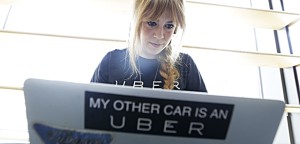Study: Competition from Uber and Lyft helps the poor

Josh Peterson | Watchdog.org
WASHINGTON, D.C. — Low fares of competing taxi and ridesharing services enable the companies to serve low-income communities, according to a study published Tuesday.
CAN’T WE ALL JUST RIDE ALONG?: Jen Joyce, a community manager for the Uber rideshare service, is seen working on her laptop before a meeting in Seattle. Competition between taxi companies and ride-sharing services could work to keep fares low and benefit the poor, a new study says.
While taxi regulations are commonly cited as a means to protect consumers from high prices, a new report by the Mercatus Center at George Mason University challenges that assumption, arguing regulations and the price of taxi licenses, or medallions, artificially keeps prices high and discourages new entrepreneurs from entering the market.
“By increasing the number of vehicles in operation, deregulation forces companies to expand service into new areas, and with little to no increase in rates,” write the study’s authors, Stewart Dompe and Adam C. Smith.
“Under regulation, firms had more customers than capacity and could pick and choose their fares. Unscrupulous drivers could ignore certain individuals and neighborhoods and be certain they would find customers elsewhere,” write Dompe and Smith.
“But deregulation increases the opportunity cost of turning down a fare. Now, a driver may not be able to afford to ignore a request,” they write, “This is why, in practice, Uber and Lyft fares have remained fairly uniform.”
The competition between ridesharing companies like Uber and Lyft, which enable both riders and drivers to rate their experiences through a smartphone app the customer uses to order rides, and locally entrenched taxi cab services has led to legal battles across the country.
Ridesharing companies promote their services as a safer and more affordable alternative to taxi cabs, but taxi drivers have protested against the new companies for lost business and operating outside of taxi regulations.
Republican Party luminaries, such as anti-tax crusader Grover Norquist, president of Americans for Tax Reform, have wasted little time trying to use Uber’s local regulatory battles as an opportunity to reach younger and more tech-saavy voters.
A court hearing to determine Uber’s future in Las Vegas is scheduled for Wednesday morning, reports the Las Vegas Review-Journal.
Nevada placed a ban on Uber in the state until Nov. 7 for drivers operating without a transportation license, a ban which drivers reportedly violated over the weekend.
Uber, which currently operates in 45 countries and 200 cities around the world, didn’t return Watchdog.org’s request for comment by the time of publication.
Contact Josh Peterson at jpeterson@watchdog.org. Follow Josh on Twitter at @jdpeterson







